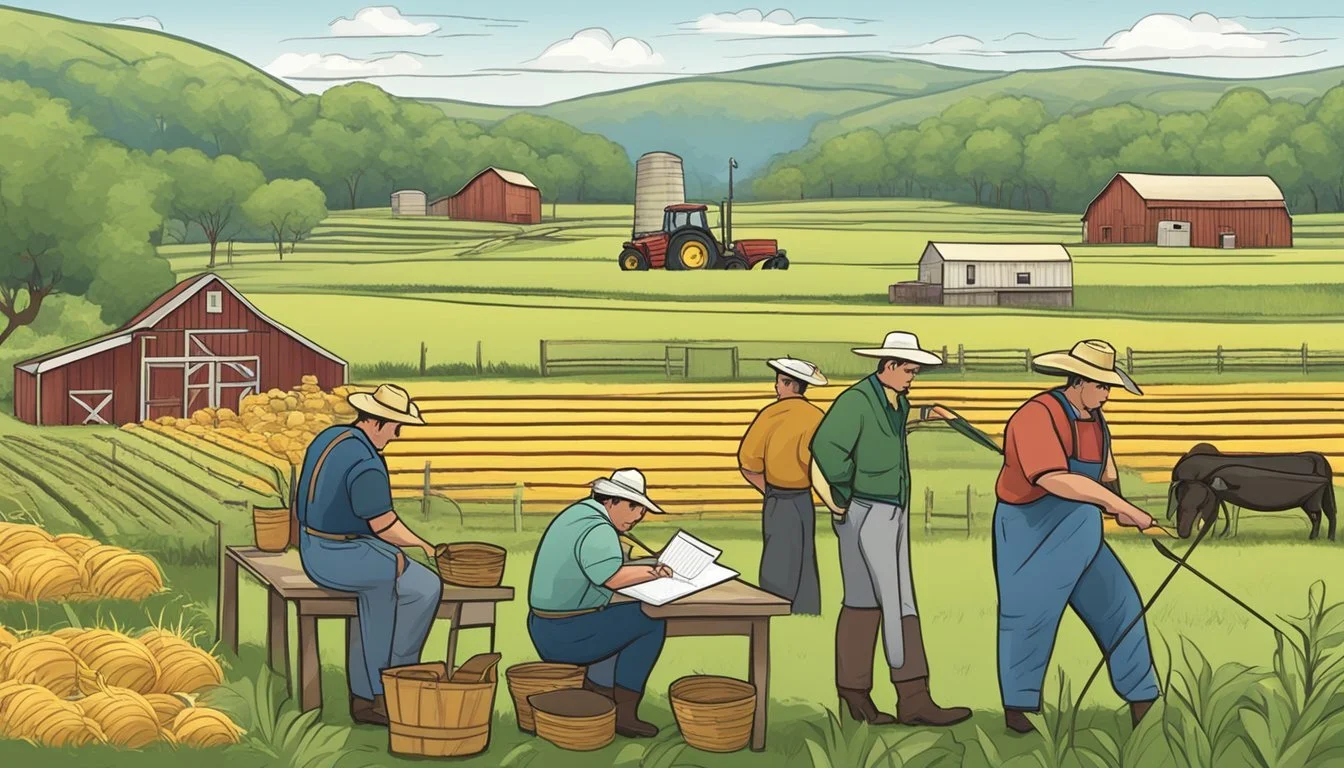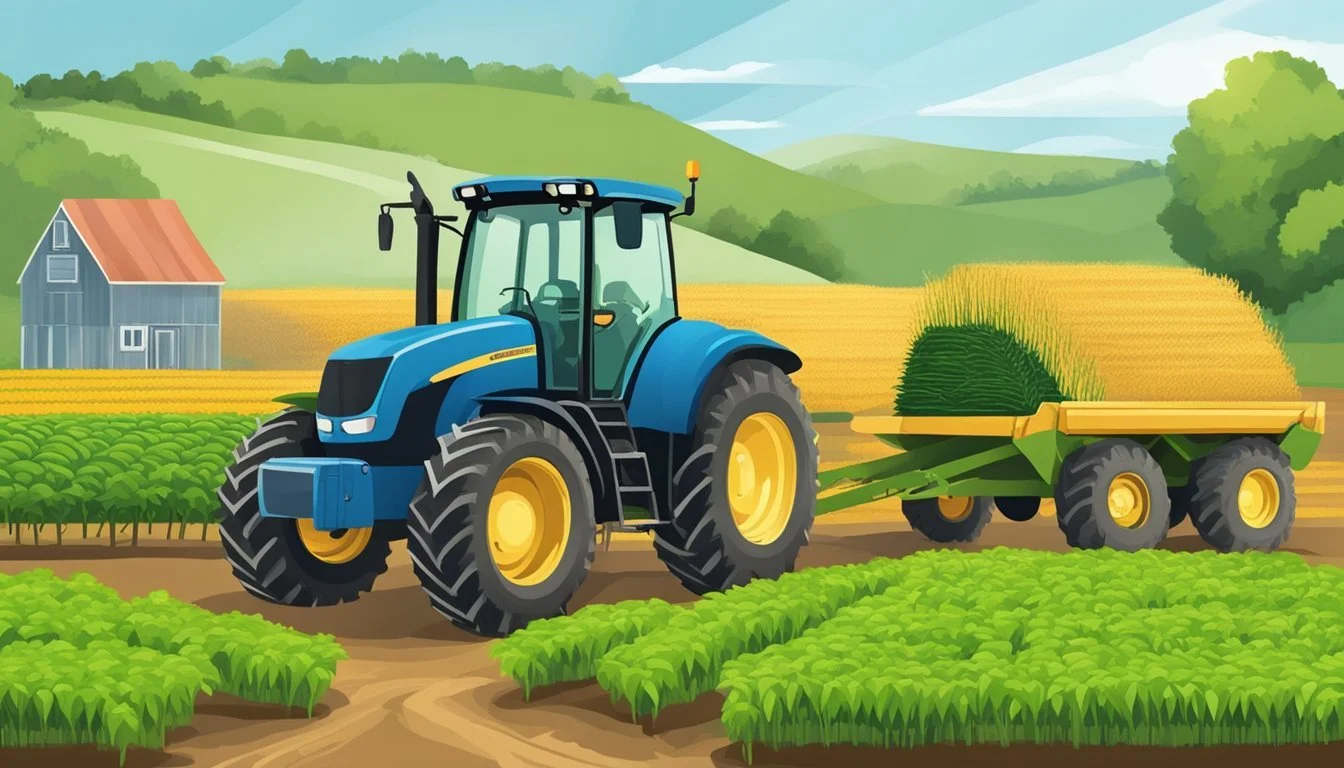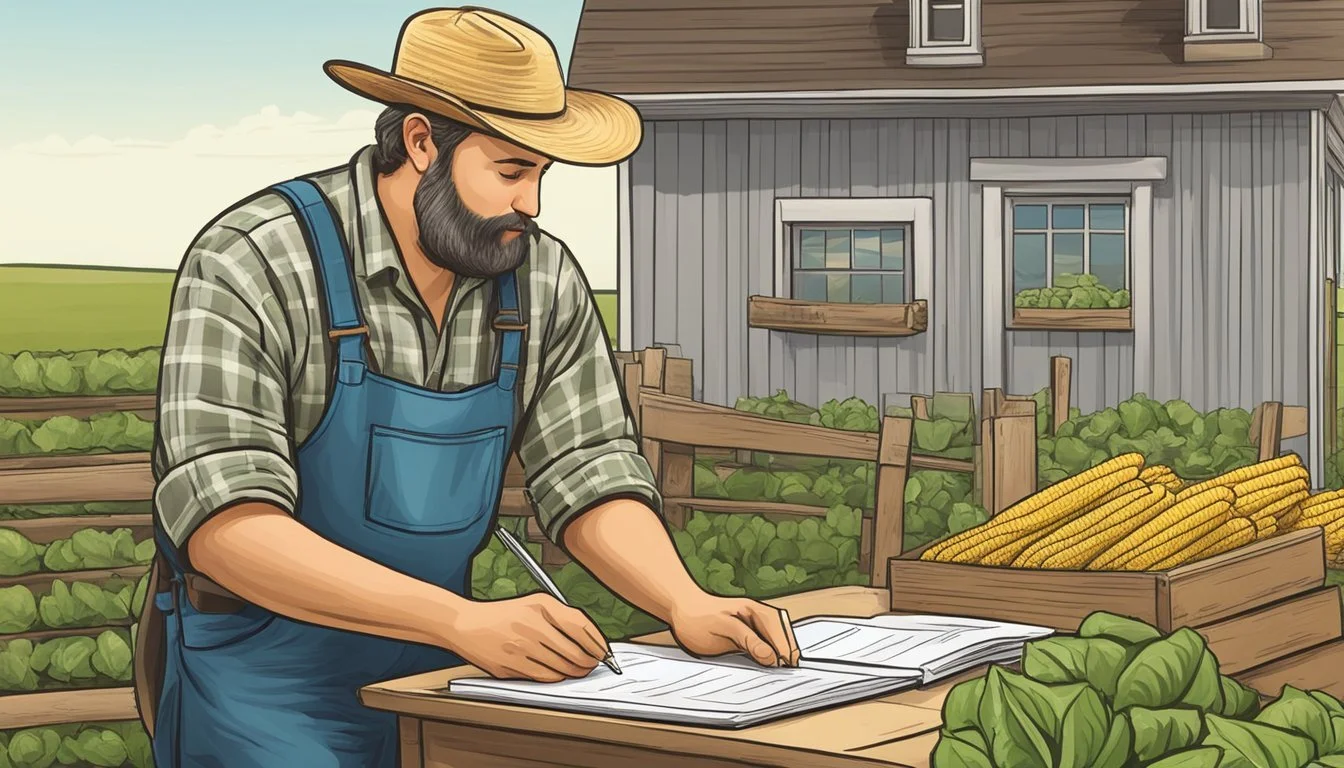Farming Grants New York
Secure Funding for Agriculture Projects
New York State actively supports its agricultural sector through various farming grants designed to enhance the vitality of its food system and to foster environmental stewardship. With an emphasis on sustainability and innovation, these grants provide farmers with opportunities to access new markets, improve infrastructure, and adopt climate-resilient farming practices. Funding is also directed towards initiatives that integrate local, healthy foods into schools and bolster marketing efforts for agricultural producers and retailers across the state.
In addition to general agricultural grants, New York State offers targeted funding to assist specific groups within the farming community. Beginning and Socially and Economically Disadvantaged Farmers are given special attention with programs aimed at helping them establish and scale up their agricultural businesses. Identifying gaps in support, the Department of Agriculture and Markets prepares new rounds of grants, administers funds, and connects farmers with resources that are critical to the success and sustainability of their ventures.
As environmental concerns continue to rise, New York State has introduced grant opportunities that focus on reducing greenhouse gas emissions and promoting energy savings on farms. These projects are part of a broader effort to mitigate water and soil quality concerns, increase on-farm resiliency to climate change, and uphold New York's commitment to building a robust and sustainable agricultural future.
Overview of Farming Grants in New York
New York State offers a variety of grants aimed at fostering the growth and sustainability of its agricultural sector. Funding Opportunities provided by the Department of Agriculture and Markets reach numerous facets of the industry, including:
Connecting farmers with new markets
Marketing support for producers and retailers
Integration of local, healthy foods into schools
Infrastructure enhancements for fairgrounds and animal shelters
Promotion of climate resilience in farming practices
The Beginning and Socially and Economically Disadvantaged Farmers program illustrates New York State's dedication to inclusive support within the agriculture community. Upcoming grants in this category are designed to aid these farmers in establishing and scaling their businesses.
Furthermore, New York State has announced grants totaling $21 million to support agricultural projects including:
Reduction of greenhouse gas emissions
Enhancement of on-farm energy savings
Mitigation of water and soil quality issues
Improvement of on-farm climate change resiliency
The JDA Agriculture Loan Fund is specifically structured to alleviate the economic challenges of small agricultural businesses. This encompasses a broad range of entities such as value-added processors and beverage producers.
The 2024 Urban Farms and Community Gardens Grant Program is another initiative by the state, supporting urban agriculture and fostering community engagement.
These grant programs represent New York State's multifaceted approach to advancing and securing a robust future for local agriculture.
Eligibility Criteria for Applicants
Eligibility criteria for farming grants in New York are designed to support producers and farmers who are starting or expanding their agricultural operations. These criteria aim to foster a diverse agricultural sector, focusing on beginning farmers and socially and economically disadvantaged groups.
Requirements for Producers
Producers applying for grants should meet the following requirements:
Beginning Farmer: Individuals should be in the first 10 years of business, demonstrating a significant ownership in a farm operation. This operation must generate at least $10,000 in sales annually.
Match Funding: There may be a requirement for match funding, up to 20% of the grant amount. This means if a producer receives a $10,000 grant, they must provide $2,000 of their own funding.
Project Eligibility: Eligible projects may include start-up costs, improvement, or expansion activities, along with worker training or apprenticeship programs.
Eligible Entities:
Farmers or agricultural producers in New York State.
Socially and economically disadvantaged farmers, as defined by grant-specific criteria.
Farmland Conservation Initiatives
For programs focused on farmland conservation, applicants might need to adhere to the following:
Non-Profit Status: Applicants should generally be a 501(c)(3) organization or have a fiscal sponsor.
State Alignment: Activities should align with the goal of accessing and/or transferring farmland within New York State.
Mission Relevance: Applicants need to demonstrate that the proposed work is critical to their mission and complies with the guidelines of the specific funding opportunity.
Entities eligible for farmland conservation initiatives could include non-profit organizations and other groups focused on the sustainable development and conservation of agricultural land in the state.
Grant Application Process
The grant application process for farming grants in New York is a structured procedure that requires attention to detail and adherence to key deadlines. Applicants are provided with resources to assist them through each step.
How to Apply for Grants
To apply for agricultural grants in New York, organizations and individuals must first register with the Grants Gateway, which is an online portal created by the state to streamline the application process. Registration is mandatory before one can proceed with an application. After registration, users have the ability to log in, review existing applications, or initiate new ones.
Register on the Grants Gateway system.
After registration, log in to the Grants Gateway Home page.
Navigate to the Grant Opportunity Portal for a list of available grants.
Select the relevant grant opportunity and start a new application.
Key Deadlines and Instructions
New York State agricultural grants have specific deadlines that vary depending on the grant program. Missing a deadline can result in a loss of opportunity to secure funding. It is crucial for applicants to:
Check the exact deadline for the grant they are interested in.
Follow the instructions provided for each grant application carefully, as they may vary.
Provide all required documentation and reports with their application.
Adhere to the application timeline and submit before the deadline.
Entity Requirement Instructions Follow specific guidance for each grant application. Deadline Verify and comply with the grant-specific deadline. Application Complete all sections of the application form. Report Prepare required reports if stipulated.
The Department of Agriculture and Markets provides resources and training to support applicants, ensuring they are well-prepared to apply for grant opportunities. It is essential to utilize these resources for guidance through the application process.
Types of Farming Grants Available
New York supports its agricultural sector with grants aimed at a variety of initiatives, including the advancement of climate resilient farming practices, expansion into new markets, and the protection of farmland. These funding opportunities are essential for farmers looking to modernize, stay healthy, and expand their reach while ensuring their practices promote sustainability and provide for local communities.
Climate Resilient Farming Grants
Climate Resilient Farming Grants focus on assisting farmers in adapting to extreme weather changes and reducing their carbon footprint. They provide funding for projects that enhance soil health, improve water management, and implement renewable energy practices on farms.
Healthy Foods and Market Expansion Grants
These grants encourage the production and marketing of healthy food by connecting farmers with new markets and increasing access to fresh produce in schools and local communities. By promoting local, healthy foods, these grants strive to support beginning farmers and agricultural producers in bolstering their market presence.
Farmland Protection Grants
Farmland Protection Grants are designed to prevent the conversion of agricultural land to non-farming uses, ensuring long-term farming sustainability. They support efforts to conserve valuable farmland and assist farmers in implementing practices that protect soil and water resources.
Strategies for Successful Applications
When navigating the competitive landscape of farming grants in New York, it is crucial for applicants to present a compelling case. Producers should focus on clearly articulating their marketing efforts and how the grant will enhance these strategies.
Understanding the Grant's Objectives: Grants are highly competitive, and a successful application must align closely with the grantor's aims. Applicants should review previously funded projects to gauge expectations.
Detailed Budget Planning: A meticulously detailed budget demonstrates financial understanding and planning. It should encompass both current expenses and projected costs related to grant funding.
Impactful Marketing Strategy: Emphasize how the grant will bolster marketing efforts. Clearly outline any potential growth in new markets and the methods to achieve this.
Project Viability and Sustainability: Outline the project's long-term benefits, ensuring that the proposal showcases sustainable practices where applicable.
Do's Don'ts Align with grant objectives Submit generic applications Provide detailed budgets Overlook necessary financial information Demonstrate marketing ingenuity Be vague about marketing strategies Highlight sustainable practices Ignore long-term project viability
By adhering to these strategies, applicants can increase their chances of securing funding in a highly competitive arena. A well-crafted application not only communicates the immediate goals but also the lasting value added to New York's agricultural sector.
Funding Allocation and Use
In New York State, funding for agriculture is meticulously allocated and requires detailed reporting from recipients. This ensures that funds are used effectively to support farming enterprises and the wider agricultural sector.
Budget Management and Reporting
The budget allocated for agricultural grants is managed with precision. Recipients are required to maintain a detailed account of how the funds are utilized, aligning them with the specific purposes for which they were awarded. For instance, grant opportunities like the New York Food for New York Families program have clear deadlines, such as February 15, 2024, by 3:00 pm, indicating a structured budgetary timeline.
Organizations responsible for disbursing these funds generate comprehensive reports reflecting the financial activities related to the grants. These reports are critical for transparency and are often necessary for securing future funding.
They must report on:
Budget Utilization: How the allocated funds are being spent.
Outcome Tracking: The direct results of the funded initiatives.
Grant programs designed for emergency medical services, food distribution, and farmland preservation have unique budgetary specifications and reimbursement processes. The reporting process includes submitting documents that reflect actual expenses, ensuring that the funds have been spent in accordance with the grant agreement.
For reimbursement purposes, recipients are often required to submit requests supported by invoices and proof of payment to receive funds, rather than getting advance payment. This flow of funds must be reported accurately to continue eligibility for reimbursement and for potential future funding opportunities.
State-Supported Agriculture Development Initiatives
New York State provides a robust portfolio of grants designed to foster sustainable agricultural practices and introduce innovative technologies. These initiatives target environmental stewardship and the incorporation of technology to enhance the agricultural sector's efficiency and resilience.
Environmental Stewardship Programs
The New York State Department of Agriculture and Markets oversees a collection of programs aimed at empowering farmers to implement climate-resilient practices. These include efforts to reduce greenhouse gas emissions and promote energy savings. Specifically, grants are offered for projects that address water and soil quality concerns, thus ensuring a healthier ecosystem. To bolster these endeavors, $21 million has been allocated for projects that support on-farm resilience to climate change.
Innovation and Technology in Agriculture
New York seeks to bridge the gap between traditional farming methods and modern technology. Funding opportunities that encourage the use of innovative tools and practices are a testament to this commitment. For instance, initiatives are in place to connect farmers with new markets and support marketing for producers and retailers. The state is also preparing a new round of grants for Beginning and Socially and Economically Disadvantaged Farmers. This support extends to urban agriculture, aiming to make it easier for new farmers to establish themselves and thrive in a rapidly evolving industry.
Resources for Ongoing Farmer Support
Farmers in New York have access to an array of resources that are specifically designed to bolster ongoing education and business planning efforts. These resources support sustainable growth, enhance producer income, and provide essential training and consultation services.
Educational Opportunities and Training
Farmers who wish to continue their education or seek specialized training can leverage programs like Cornell University's Northeast Beginning Farmers Project. This initiative offers a comprehensive suite of resources, such as the Guide to Farming in NYS, designed to educate and equip farmers with the necessary tools to thrive in a competitive market.
Training Resources:
Workshops
Online Courses
Field Days
Another valuable opportunity is the NYS Specialty Crops Block Grants Program, which not only encourages the growing competitiveness of specialty crops but also provides educational efforts to increase efficiency and innovation in farming practices.
Consultation and Farm Business Planning
For more personalized support, New York's farmers can turn to consultants for assistance in farm business planning. The state's Department of Agriculture and Markets provides a Beginning Farmer Page with links to advisers who specialize in developing strategies to scale up operations, improve infrastructure, and explore new market opportunities.
Available Business Planning Services Include:
One-on-one consultations
Financial assessment
Strategy development
With comprehensive planning and expert advice at hand, farmers are better equipped to make informed decisions that contribute positively to their business pursuits and long-term financial stability.
Regulatory Considerations and Compliance
When engaging with farming grants in New York, farmers and agricultural businesses must navigate a variety of regulatory considerations, especially in relation to food safety and infrastructure, ensuring they meet state and federal standards.
Food Safety and Infrastructure
Food Safety: Farmers must comply with the Food Safety Modernization Act (FSMA), which includes provisions for the Produce Safety Rule. They need to follow specific practices to prevent contamination and ensure their products are safe for consumption. Grants may be available to assist farmers in upgrading their equipment and processes to comply with these regulations.
Key areas of compliance include:
Worker hygiene
Water quality used for irrigation
Manure and other soil amendments
Presence of animals on farms
Infrastructure: The condition of farm infrastructure impacts both safety and compliance. New York State offers funding to improve critical infrastructure such as:
Storage facilities for petroleum and chemicals with an emphasis on proper containment to prevent environmental contamination.
Adequate waste management systems, especially for operations that produce significant amounts of whey or other agricultural byproducts.
Farmers may also find grants that help in developing or upgrading facilities to meet the regulatory standards prescribed by both the New York State Department of Agriculture and Markets and environmental laws.
Impact of Farming Grants on Community and Environment
Farming grants in New York are designed to empower local farmers, fostering sustainable agriculture and strengthening community resilience against climate change.
Sustainable Agricultural Practices
New York farming grants have catalyzed the adoption of practices that preserve soil quality and enhance the sustainability of farmland. These practices include crop rotation, organic farming, and the implementation of advanced water conservation techniques. Empowered by grants, farmers invest in soil health to maintain the land's productivity and vitality, which directly benefits the natural resources upon which the agricultural community depends.
Economic and Social Benefits of Farming Grants
The infusion of funding into New York's agricultural sector bolsters the local economy. By receiving grants, farmers can invest in infrastructure and technology that increase production efficiency and market competitiveness. As a result, local communities benefit from job creation and a strengthened market presence. Moreover, these grants help integrate local, healthy foods into schools, supporting the well-being of the community.
Addressing Climate Change with Farming Practices
Farming grants support New York's efforts to reduce greenhouse gas emissions and establish climate resilient farming practices. By incentivizing carbon sinks—practices that absorb more carbon than they release—farming grants help align agricultural activity with climate change mitigation objectives. Through funded projects, farmers can adapt to climate variability, ensuring on-farm resiliency and the preservation of farmland for future generations.











